Subprime Mortgage Crisis
The subprime mortgage financial crisis, which has yet to be resolved, is the sharp rise in foreclosures in the subprime mortgage market that began in the United States in 2006 and became a global financial crisis in July 2007. Rising interest rates, increasing the monthly payments on newly popular adjustable rate mortgages, together with property value declines from the demise of the United States housing bubble, left many home owners unable or unwilling to meet financial commitments, and lenders without a means to recoup their losses. Many observers believe this has resulted in a severe credit crunch, threatening the solvency of a number of marginal private banks and other financial institutions. The sharp rise in foreclosures after the peak of the housing bubble caused several major subprime mortgage lenders, such as New Century Financial Corporation, to shut down or file for bankruptcy, with some accused of actively encouraging fraudulent income reporting on loan applications. This led to the collapse of stock prices for many in the subprime mortgage industry, and drops in stock prices of some large lenders like Countrywide Financial. This has been associated with declines in stock markets worldwide, several hedge funds becoming worthless, coordinated national bank interventions, contractions of retail profits, and bankruptcy of several mortgage lenders. Observers of the meltdown have cast blame widely. Some, like Senate Banking, Housing, and Urban Affairs Committee chairman Chris Dodd of Connecticut, have highlighted the predatory lending practices of subprime lenders and the lack of effective government oversight. Others have charged mortgage brokers with steering borrowers to unaffordable loans even though lenders offered these borrowers programs that found them acceptable risks, appraisers with inflating housing values, and Wall Street investors with backing subprime mortgage securities without verifying the strength of the portfolios. Borrowers have also been criticized for over-stating their incomes on loan applications and entering into loan agreements they could not meet. Some subprime lending practices have also raised concerns about mortgage discrimination on the basis of race. The effects of the meltdown spread beyond housing and disrupted global financial markets (see financial contagion and systemic risk) as investors, largely deregulated foreign and domestic hedge funds, were forced to re-evaluate the risks they were taking and consumers lost the ability to finance further consumer spending, causing increased volatility in the fixed income, equity, and derivative markets. The impact on the economy of this American problem was also felt in Europe, where the European Central Bank tried to control the crisis by injecting over USD$ 205 billion in the European financial markets.
Subscribe to:
Post Comments (Atom)

No comments:
Post a Comment